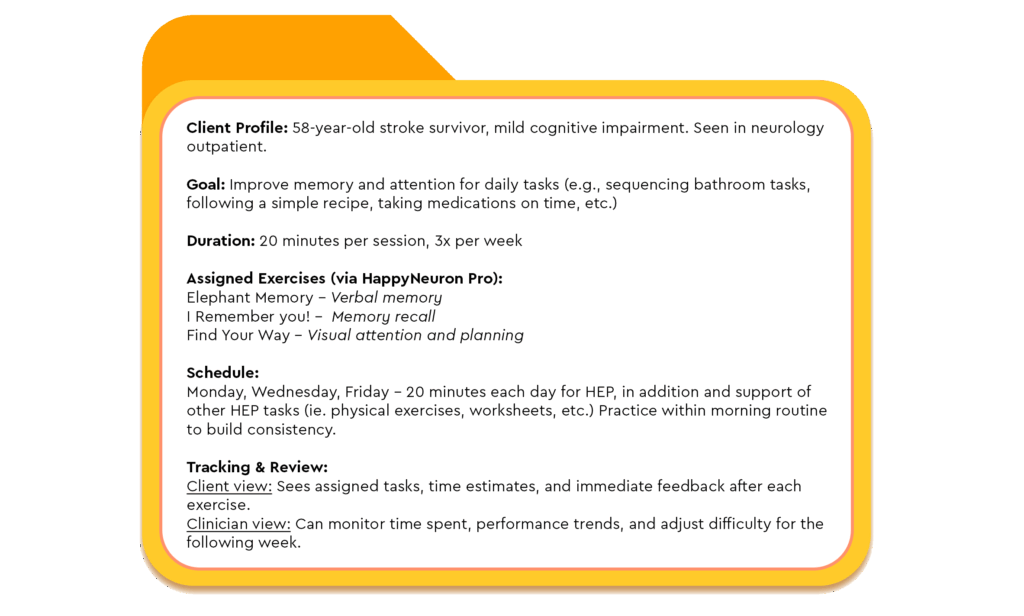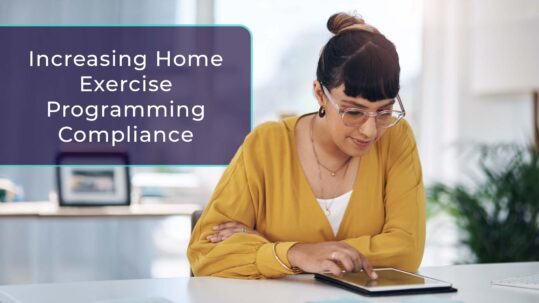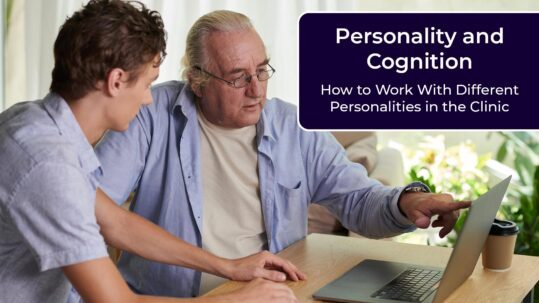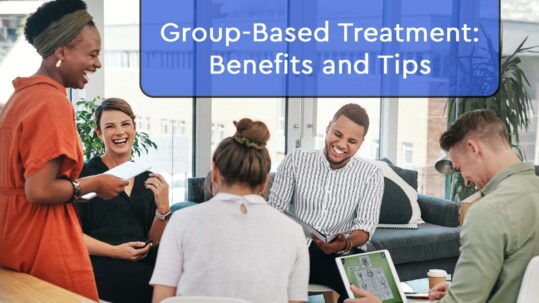Supporting ADLs and IADLs with HappyNeuron Pro
In rehabilitation and therapy, the ultimate goal is to help clients regain independence in their daily lives. Activities of Daily Living (ADLs) such as dressing, grooming, and feeding, as well as Instrumental Activities of Daily Living (IADLs) such as managing finances, cooking, and using public transportation, are essential for autonomy. The American Occupational Therapy Association’s (AOTA) Occupational Therapy Practice Framework 4th edition (OTPF-4), defines ADLs as “activities oriented toward taking care of one’s own body and completed on a routine basis.” AOTA also defines IADLs within the OTPF-4 as “activities to support daily life within the home and community” (2020).

As clinicians, you are well aware that these definitions cover a whole lot– several activities, tasks, and situations that hold meaning throughout one’s day. Cognitive functions, such as attention, memory, executive function, and language, are foundational to performing these tasks effectively. Addressing these cognitive functions to promote competence and confidence within functional tasks is key to independence within ADLs and IALs.
HappyNeuron Pro offers a digital platform designed to support and enhance these cognitive skills, facilitating the transfer of therapeutic gains to real-world activities. Our platform serves as another tool in your tool box for client cognitive skill development and functional goal attainment.
Addressing ADLs and IADLs in Cognitive Rehabilitation Leads to:
- Independence: Mastery of ADLs and IADLs promotes autonomy and confidence
- Safety: Strong cognitive skills reduce the risk of accidents or errors in daily tasks
- Quality of Life: Successful engagement in daily routines contributes to emotional well-being
- Generalization: Practicing cognitive exercises in meaningful contexts supports real-world application
How HappyNeuron Pro Supports Daily Function
HappyNeuron Pro provides evidence-informed, cognitive exercises that can be tailored by the provider for each patient, to improve their specific skills needed for ADLs and IADLs. Examples include:
- Memory exercises: Remembering sequences, steps, or important items (Elephant Memory, Seize the Keywords, and N-back.
- Attention tasks: Sustaining focus on tasks, filtering distractions, and shifting attention (Find Your Way, Ancient Writing, and Gulfstream).
- Executive function exercises: Planning, problem-solving, and sequencing (The Towers of Hanoi, Hurray for Change!, An American in Paris).
- Language exercises: Understanding and producing language for communication (Decipher, Split Words, Root it Out).
By linking these cognitive skills to the demands of daily life, clinicians can help clients practice the mental processes that support independence.
HappyNeuron Pro Exercises that simulate functional skills
HappyNeuron Pro offers a library of cognitive exercises that help simulate functional skills, giving clients opportunities to practice strategies they can apply in daily routines. Here are just a few examples:
- I Remember You!: Practice matching names and faces to support social interactions and community engagement.
- You’ve Got Voicemail: Recall auditory information, such as remembering instructions from a friend, family member, or healthcare provider.
- Seize the Keywords: Focus on key details in short texts, similar to identifying important information in written instructions, emails, or notes.
- Restaurant: Strengthen memory by recalling multiple food orders, a skill that translates to remembering tasks or steps in real-life sequences.
- Private Eye: Practice visual scanning, useful for locating words in a passage or finding a specific item on a grocery shelf.
- Ready, Steady, Count!: Build mental math skills that support money management, budgeting, and everyday numerical tasks.
To explore some of the exercises mentioned above, check out our library of digital cognitive exercises.
Creating ADL- and IADL-Focused Programs
- Identify Client Goals: Which ADLs or IADLs are most challenging? Which ones do they find meaningful and important? Examples: simple meal prep, remembering to take medication, sequencing hygiene).
- Select Targeted Cognitive Exercises: Choose exercises in HappyNeuron Pro that align with the cognitive skills demands of those tasks.
- Simulate Real-World Context: Encourage clients to think about how exercises relate to everyday routines (e.g., practicing sequencing exercises to support following a recipe).
- Set HEPs for Home Practice: Assign exercises for consistent practice outside of therapy sessions, scheduling them around daily routines. Encourage practice of ADLs and IADLs as part of home exercise programming (HEP).
- Track and Review: Use built-in reporting features to monitor progress, adjust difficulty, and provide client feedback. Collaborate with clients and caregivers on progression and next steps.
Sample IADL-Focused Home Exercise Program Template

Conclusion
Supporting ADLs and IADLs is a core part of cognitive rehabilitation and cognitive remediation. HappyNeuron Pro helps clinicians bridge cognitive practice and functional skill building by offering engaging, science-informed exercises that target the skills clients need most. By integrating these exercises into therapy, and home practice and routines, clinicians can help further support client’s self-assurance and quality of life.
References
Occupational Therapy Practice Framework: Domain and Process—Fourth Edition. Am J Occup Ther August 2020, Vol. 74(Supplement_2), 7412410010p1–7412410010p87. doi: https://doi.org/10.5014/ajot.2020.74S2001









